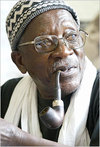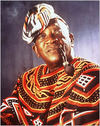June 11, 2007
 Ousmane Sembène, the Senegalese filmmaker and writer who was a crucial figure in Africa’s postcolonial cultural awakening, has died at his home in Dakar, Senegal. His family, which announced his death on Sunday, said Mr. Sembène had been ill since December. He was 84. Widely seen as the father of African cinema, Mr. Sembène took up filmmaking in the 1960s, in part because he believed that film could reach a wider and more diverse African audience than literature. “Black Girl” (1965), his debut feature, is commonly referred to as the first African film. Combining realistic narrative techniques with elements of traditional African storytelling, it tells of a young woman named Diouana who commits suicide after traveling to Europe with her French employers.
Ousmane Sembène, the Senegalese filmmaker and writer who was a crucial figure in Africa’s postcolonial cultural awakening, has died at his home in Dakar, Senegal. His family, which announced his death on Sunday, said Mr. Sembène had been ill since December. He was 84. Widely seen as the father of African cinema, Mr. Sembène took up filmmaking in the 1960s, in part because he believed that film could reach a wider and more diverse African audience than literature. “Black Girl” (1965), his debut feature, is commonly referred to as the first African film. Combining realistic narrative techniques with elements of traditional African storytelling, it tells of a young woman named Diouana who commits suicide after traveling to Europe with her French employers.
Diouana’s identity crisis foretold some of the central themes of Mr. Sembène’s later work — he directed 10 features and numerous shorts — and of the nascent African cinema more generally. The tensions between tradition and modernity and between newly independent African nations and their erstwhile colonial masters are sources of drama and comedy in his films, which are nonetheless focused on the lives of ordinary people, frequently women.
“Xala” (1974), which many critics consider his finest film, takes a humorous look at polygamy, traditional African medicine and the contrasts between urban and rural life. Neither mocking nor nostalgic in its treatment of traditions, it is as much driven by the personalities of its characters as by its ideas about African life. At the same time, the characters’ foibles are clearly symbols of political and social dysfunction.
A similar logic obtains in later films like “Guelwaar” (1993) and “Faat-Kiné” (2001). Writing about the latter movie in The New York Times, Elvis Mitchell noted that some of its scenes could have been “whipped up into a tempest of tear-jerking” but that Mr. Sembène’s “trademark empathy” and sense of detail served as antidotes to melodrama. Even when he addressed painful and controversial subjects — as in “Moolaadé” (2004) which chronicles a middle-aged woman’s campaign to halt the practice of female genital cutting in her village — Mr. Sembène tempered moral fervor with warmth and humor.
Ousmane Sembène was born on Jan. 1, 1923, in the Casamance region of southern Senegal. He left school at 14 and moved to Dakar. There and in France, he worked as a fisherman and an auto mechanic, among other jobs, before being drafted by the French Army in World War II. His experiences as a dockworker in Marseilles formed the basis of one of his novels, “The Black Docker.”
He studied film at Gorky Studio in Moscow, turning to the medium because, as he put it in 2005, “everything can be filmed and transported to the most remote village in Africa.” After making three short films, he submitted the script for “Black Girl” to the Film Bureau of the French Ministry of Cooperation, an agency set up by the government of Charles de Gaulle to assist African filmmakers. The script was rejected, and while Mr. Sembène was able to complete the film independently, some of his later films would run into trouble with both French and Senegalese authorities. “Mandabi” (“The Money Order,” 1968), was attacked in Africa for its portrayal of political corruption and economic devastation, and “Emitai” (1972) was suppressed in France for five years because of its harsh depiction of colonialism.
“He could criticize Africa, he could criticize racism and he could criticize colonialism,” said Manthia Diawara, professor of comparative literature and Africana studies at New York University, in a telephone interview on Sunday. “He never spared anybody.”
In spite of occasional controversy, Mr. Sembène’s mastery and originality were celebrated both in Africa, where he served as an inspiration for later filmmakers, and internationally. He won prizes at the Venice Film Festival in 1968 (for “Mandabi”) and 1988 (for “Camp de Thiaroye”), and at Cannes in 2004 (for “Moolaadé”). He was a founder, in 1969 of FESPACO, the biennial festival of film and television held in Ouagadougou, Burkina Faso.
Cheick Oumar Sissoko, a fellow filmmaker and the Malian minister of culture, said that with Mr. Sembène’s death, “African cinema has lost one of its lighthouses.”
Mr. Diawara added: “He really is the most important African filmmaker. The one that all subsequent filmmakers have to be measured against.”
.
.A Filmmaker Who Found Africa's Voice
 Ousmane Sembène, by consensus the father of African cinema, was nearly 40 when he started making films. (He was 84 when he died over the weekend at his home in Dakar ). By 1960, the year that Senegal , his native country, won its independence from France, he was already a novelist of some reputation in Francophone African circles
Ousmane Sembène, by consensus the father of African cinema, was nearly 40 when he started making films. (He was 84 when he died over the weekend at his home in Dakar ). By 1960, the year that Senegal , his native country, won its independence from France, he was already a novelist of some reputation in Francophone African circles







Commentaires